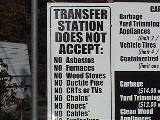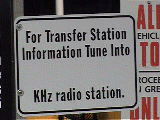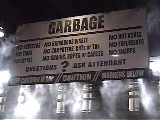 Because I live so close to it, I take an interest in how well Seattle’s north-end waste transfer/recycling station is run (as if that is not obvious by now, this being my third and, thankfully, last post on the subject). The Wallingford neighborhood in which it is located is known for its tolerant, liberal-minded denizens, which explains why, in addition to the waste transfer station, the city has also placed numerous mental halfway houses and drug rehab centers there.
Because I live so close to it, I take an interest in how well Seattle’s north-end waste transfer/recycling station is run (as if that is not obvious by now, this being my third and, thankfully, last post on the subject). The Wallingford neighborhood in which it is located is known for its tolerant, liberal-minded denizens, which explains why, in addition to the waste transfer station, the city has also placed numerous mental halfway houses and drug rehab centers there.
But I digress. There is an endless parade of interesting signs at this garbage relay station that no one pays any attention to. For years there was one that read “no mixed loads,” meaning that you could arrive with garbage, recyclables, or clean green, but not a mixture. Everyone, including the attendants, ignored that one. Dump clientele have always dutifully pulled the recyclables out and paid the full price for each load anyway. Who in their right mind would make three separate trips to the dump, one for each type of load?
Then there was the “no cell phones” sign — also ignored by all. Busy (paying) contractors were actually expected to happily blow off important business calls while they sat in the dump line.
 New signs have been propogating lately (so many, in fact, you can hardly see the weigh-station shack). My favorite is the one that says, “For transfer station information tune into KHz radio station.” I now listen to it regularly, along with NPR …
New signs have been propogating lately (so many, in fact, you can hardly see the weigh-station shack). My favorite is the one that says, “For transfer station information tune into KHz radio station.” I now listen to it regularly, along with NPR …
Speaking of which, I listened to a show on NPR a month ago about King County’s new E-waste policy. We were told that e-waste would no longer be accepted after October 1.
 Oddly enough, and apparently unknown to the city official in charge of the project, the attendants at Seattle’s north-end station had already been screening out e-waste for about six months prior to the day the ban was supposed to take effect. All it took was to add e-waste items to the the numerous signs.
Oddly enough, and apparently unknown to the city official in charge of the project, the attendants at Seattle’s north-end station had already been screening out e-waste for about six months prior to the day the ban was supposed to take effect. All it took was to add e-waste items to the the numerous signs.
One really should be able to drive to single place (like a transfer station) and pay to get rid of most anything you have: hazardous waste (common household chemicals), latex paint, garbage, e-waste, and other recyclables. Making it illegal not to recycle, having to make appointments to dispose of hazardous waste, having to track down one place to take your e-waste and another for your latex paint, while simultaneously sorting your home and yard waste into four separate containers, is getting a little out of hand. We can certainly do better than this, and if we do, other cities will eventually emulate us.
 Because I live so close to it, I take an interest in how well Seattle's north-end waste transfer/recycling station is run (as if that is not obvious by now, this being my third and, thankfully, last post on the subject). The Wallingford neighborhood in which it is located is known for its tolerant, liberal-minded denizens, which explains why, in addition to the waste transfer station, the city has also placed numerous mental halfway houses and drug rehab centers there.
Because I live so close to it, I take an interest in how well Seattle's north-end waste transfer/recycling station is run (as if that is not obvious by now, this being my third and, thankfully, last post on the subject). The Wallingford neighborhood in which it is located is known for its tolerant, liberal-minded denizens, which explains why, in addition to the waste transfer station, the city has also placed numerous mental halfway houses and drug rehab centers there.

